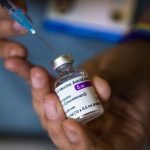Germany’s top health officials have warned that the third wave of coronavirus could be the worst to hit the country so far.
Lothar Wieler, head of the Robert Koch Institute (RKI) for Infectious Diseases, said there could be as many as 100,000 new coronavirus cases daily if the disease is not curbed.
Germany reported 21,573 new cases on Friday, according to the RKI, with another 183 deaths bringing the total to 75,623.
Live COVID updates from across the UK and around the world
Mr Wieler said: “There are clear signals that this wave could become significantly worse than the first two waves.
“We must prepare for the number of cases rising strongly and that more people get seriously ill again, that hospital will get overburdened and that a lot of people will die.
“We are just at the beginning of this development and if we don’t massively counter-steer immediately, the consequences will be grave.”
Mr Wieler said that “all indications” were pointing to a worsening of the situation in the coming weeks, with the seven-day incidence rate “rising rapidly”.
The rate rose to 119 new cases per 100,000 people on Friday, compared to Thursday’s rate of 113. Two weeks ago it was 70, he said.
Subscribe to the Daily podcast on Apple Podcasts, Google Podcasts, Spotify, Spreaker
“The number of cases is rising rapidly and all age groups are affected, especially the working population aged under 65 as well as children and adolescents.
“We can no longer avoid this wave but we must try to flatten it as much as possible to at least weaken the consequences.
“In order to do that, we must avoid infecting others, now, immediately and with all possibilities at our disposal.”
He was speaking at a joint press conference with Germany’s health minister, Jens Spahn, who warned Germans that, without significant intervention, the country’s health system could “reach its breaking point” in April.
All airline passengers entering Germany will need to provide a negative coronavirus test result from Tuesday, he said, admitting that he realised this rule alone was “not a game changer”.
He also called on local authorities to be more flexible with their approach to vaccination and to offer unused doses to anyone aged over 70 during the weekend to reduce stocks more quickly.
Germany’s vaccination programme, like that across the European Union, has been slow, with only around 10% of adults having received at least a first dose.






















